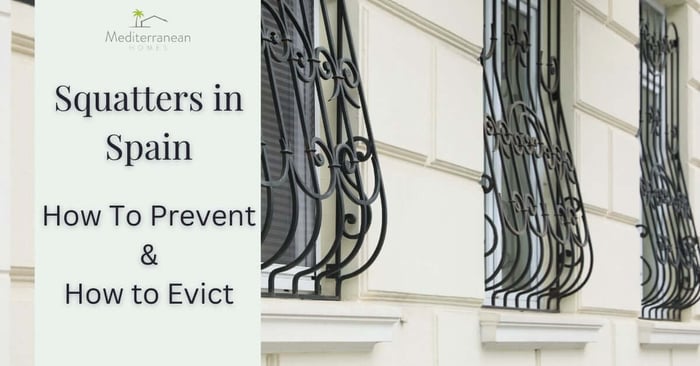Squatting ("okupación") remains a concern for property owners in Spain, particularly non-residents and those with vacant properties and properties that are rented out. While legislation has evolved, including efforts like Law 5/2018, many challenges persist. Here's a quick guide explaining what squatters are, how to prevent them and how to evict them
Table of Contents
What Are Squatters?
Squatting refers to occupying a property without the owner's permission. This often involves entering uninhabited homes and staying there without any legal contract or right.
Two Legal Categories
1. Usurpación: Occupation of an empty or unused property. This is typically a civil matter.
2. Allanamiento de morada: Invasion of a home that is regularly used or a primary residence. This is a criminal offence and can prompt immediate police action.
Is Squatting Legal in Spain?
No. Squatting is not legal. However, legal responses vary based on whether the property is in active use and how quickly the situation is reported:
- Used residences (main or secondary): If the occupation is reported within 48 hours, police may remove squatters immediately.
- Long-vacant properties: Eviction usually requires court proceedings, which can take weeks or months.
Fast-Track Eviction (Ley 5/2018)
Law 5/2018 was introduced to help speed up eviction procedures for unauthorised occupants. However, in practice, it has not always proven useful.

Potential Problems With Evicting Squatters
- Delays in courts: Many property owners experience long waits for hearings and rulings, despite the law’s intent to expedite cases.
- Burden of proof: Owners must demonstrate legal title and initiate proceedings, which can be time-consuming.
- Limited scope: The law doesn’t apply to tenants with expired contracts or rental disputes, which can complicate matters.
- No police enforcement: Unlike criminal offences, civil eviction still requires a judge’s approval and does not permit immediate police intervention.
While Law 5/2018 helps in some situations, it often falls short for owners needing urgent resolution, especially in larger cities with overwhelmed courts.

How to Prevent Squatters From Entering Your Property In Spain
Squatting is a concern for many property owners in Spain, especially for those who rent out their homes or leave them vacant for extended periods. While the law has improved in recent years, prevention remains the best solution. At Mediterranean Homes, we’ve put together this practical guide to help you safeguard your property.
1. If You Are Renting Out Your Property
Renting your property can be a great way to generate income, but it's essential to screen tenants carefully and take preventative steps to avoid squatters gaining possession. Here are our recommendations:
- ✅ Use a legally binding rental contract — Ensure the contract complies with Spanish rental laws and includes all necessary clauses to protect your rights.
- ✅ Verify tenant identity and income — Ask for proof of employment, income statements, and references from previous landlords.
- ✅ Register your rental agreement — Register the contract with the local housing authority where required.
- ✅ Include clear clauses about eviction and responsibilities — This can speed up the legal process in the event of non-payment or illegal occupation.
- ✅ Carry out regular inspections — Make periodic visits or appoint a property manager to monitor the condition of the property and ensure compliance.
- ✅ Maintain insurance coverage — Consider landlord insurance that includes protection against damages caused by illegal occupants and non-payment of rent.
2. If the Property Is Left Vacant for Long Periods
Vacant properties are more vulnerable to illegal occupation. If you plan to leave your property empty for several weeks or months, consider the following preventive measures:
- ✅ Install an alarm system with remote monitoring — A visible security system acts as a strong deterrent.
- ✅ Use motion-sensor lighting and timed interior lights — These give the impression that the property is occupied.
- ✅ Secure all entry points — Reinforce doors and windows with security shutters or upgraded locks.
- ✅ Place “No Trespassing” or “Vigilado por Cámaras” signs — Visible warnings deter opportunistic squatters.
- ✅ Ask neighbours or local contacts to keep an eye on the property — Frequent visible activity discourages illegal entry.
- ✅ Use a vacant property management service
- ✅ Keep utility services active — An active electricity or water meter suggests occupancy and makes illegal use easier to detect.
Need Help Protecting Your Property?
Whether you're renting your property or leaving it vacant for the season, our team at Mediterranean Homes can offer peace of mind. We provide property rental management and carry out THOROUGH tenant vetting and vacant home care to help keep your home safe from illegal occupation. Contact us today to discuss a personalised plan for your property.
What Can Property Owners In Spain Do To Remove Squatters?
Discovering that your property has been illegally occupied can be distressing, but it’s important to act promptly and follow the correct legal procedure. Here is a step-by-step checklist to guide you through the eviction process in Spain:
- ✅ Confirm the occupation is illegal
Ensure the people occupying your property do not have any rental agreement, expired or otherwise, that could complicate proceedings. - ✅ Report the occupation to the police immediately
If the occupation has occurred within the last 48 hours, the police may be able to remove the squatters without a court order — particularly if it’s your primary or secondary residence. - ✅ Gather evidence
Take photos, videos, and note the date and time you discovered the occupation. Collect your property title deeds or ownership documents. - ✅ Contact a specialist property lawyer
A solicitor familiar with Spanish property law can initiate the appropriate civil or criminal proceedings, depending on the case. - ✅ Initiate fast-track legal proceedings (Ley 5/2018)
If police intervention is not possible, your lawyer will file an express eviction claim through the courts. This process was introduced to speed up evictions from illegally occupied properties. - ✅ Submit proof of ownership
You will need to provide official documents showing that you are the legal owner of the property, such as the Escritura or Nota Simple. - ✅ Wait for the court order
The court will notify the squatters and set a date for them to respond or vacate. If they fail to comply, an eviction date will be scheduled. - ✅ Assist law enforcement on the eviction day
Once the court authorises the eviction, local police (Policía Local or Guardia Civil) will carry it out under supervision. Ensure you or your representative are present to change locks and secure the property. - ✅ Secure and monitor the property post-eviction
Consider installing alarms, cameras, or hiring a property management company to inspect and maintain the property regularly to prevent re-entry.
Important: If the squatters have lived in the property for a while or claim to have a rental agreement, the process could be longer and more complex. Legal support is essential in such cases.
If you're facing this situation, contact CC Lawyers or another trusted property lawyer in Spain to start the eviction process quickly and professionally.
Legislative Developments (2023–2025)
Recent Efforts to Improve Protection for Property Owners Against Squatters
- Reinforcement of Law 5/2018 procedures
- Priority processing of illegal occupancy cases in courts
- Increased penalties for property damage or utility theft by squatters
Summary
As of 2025, squatting remains illegal in Spain, but how authorities respond depends on the nature of the property and the timing of the report. Law 5/2018 introduced a fast-track eviction process, but it has practical limitations such as court delays and procedural hurdles. Immediate police intervention is most effective when squatters are reported quickly in actively used homes.
For long-vacant properties, legal proceedings are often necessary and can take time. Property owners are advised to act quickly, maintain strong security measures, and seek legal support from a qualified property lawyer to navigate the eviction process efficiently and protect their investment.
Always consult a Spanish property lawyer to understand your rights and take the correct steps based on your situation.
As property owners, understanding the legal landscape surrounding squatting is vital. The laws and regulations can be complex, and staying informed is essential for the protection of your investment. To navigate these waters effectively, it is wise to enlist the expertise of reputable legal professionals who specialise in property law.
Here is a trusted law firm based in Alicante who may be able to help you evict squatters from your property in Spain: CC Lawyers
FAQs
1. Is squatting legal in Spain?
No, squatting is illegal in Spain. However, the legal response depends on the type of property and how quickly the occupation is reported. If squatters occupy a property that is not a primary residence and remain undetected for over 48 hours, the eviction process typically requires a court order, which can be time-consuming.
2. What is the 48-hour rule regarding squatters in Spain?
If squatters are reported within 48 hours of occupying a property, especially if it's a primary or secondary residence, the police may have the authority to remove them without a court order. After this period, legal proceedings are usually necessary to evict them.
3. How long does it take to evict squatters in Spain?
The eviction process duration can vary. With the reforms introduced in April 2025 to Organic Law 6/1985, the eviction process has been expedited, allowing property owners to remove illegal occupants in just a few weeks rather than enduring months of legal delays.
4. What are the new 2025 laws regarding squatters in Spain?
The 2025 reform of Organic Law 6/1985 introduced measures to expedite the eviction process for illegal occupants. It distinguishes between home invasion (primary residence) and property usurpation (second homes), allowing courts to issue eviction orders within 15 days once the illegal occupation is confirmed.
5. Can squatters claim ownership of a property in Spain?
In rare cases, squatters might attempt to claim ownership through "usucapión" (adverse possession), but this requires uninterrupted occupation for an extended period (typically 30 years) and meeting specific legal criteria. Such claims are uncommon and challenging to prove.
6. How can I prevent squatters from entering my property in Spain?
To reduce the risk of squatting:
- Install security systems: Alarms and surveillance cameras can deter unauthorized entry.
- Regular property checks: Have someone inspect the property periodically.
- Avoid indicating vacancy: Refrain from displaying "For Sale" signs or mentioning that the property is unoccupied in listings.
- Secure entry points: Ensure doors and windows are robust and locked.
- Leave personal items: Keeping some belongings in the property can indicate it's in use.
7. What should I do if I discover squatters in my property?
- Immediate action: If discovered within 48 hours, contact the police promptly.
- Gather evidence: Document the situation with photos and records.
- Consult a lawyer: Seek legal advice to initiate eviction proceedings if necessary.
- Avoid confrontations: Do not attempt to remove squatters yourself, as this can lead to legal complications.
8. Are there services to help evict squatters in Spain?
Yes, there are legal firms and specialized companies that assist property owners in evicting squatters. It's advisable to consult with a reputable lawyer experienced in Spanish property law to navigate the eviction process effectively.






